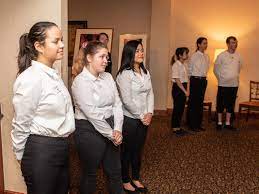The Hospitality Degree: Unlocking a World of Opportunity
In today’s ever-evolving global landscape, the hospitality industry stands as a pillar of growth and opportunity. With its diverse range of sectors and the increasing demand for exceptional guest experiences, pursuing a hospitality degree has become an enticing path for individuals seeking a rewarding career.
A hospitality degree equips students with the necessary skills and knowledge to thrive in this dynamic industry. From hotel management to event planning, tourism to food and beverage operations, this field offers a wide array of specializations that cater to various interests and passions. The beauty of a hospitality degree lies in its versatility – it opens doors to countless opportunities both nationally and internationally.
One of the key advantages of studying hospitality is the practical nature of the curriculum. Many programs emphasize hands-on learning, providing students with real-world experience through internships, industry placements, and simulated scenarios. This exposure not only enhances their technical skills but also cultivates essential attributes such as adaptability, problem-solving, and effective communication – all vital traits for success in this people-centric industry.
Moreover, studying hospitality goes beyond acquiring theoretical knowledge; it fosters a deep understanding of customer service excellence. The industry places great emphasis on creating memorable experiences for guests, which requires a combination of interpersonal skills, cultural awareness, and attention to detail. A hospitality degree hones these abilities by immersing students in scenarios that simulate real-life customer interactions, enabling them to develop strong service-oriented mindsets.
Another compelling aspect of pursuing a hospitality degree is the global nature of the industry itself. Hospitality knows no boundaries; it thrives on diversity and embraces individuals from different cultures and backgrounds. This presents graduates with exciting opportunities to work in various countries around the world or even embark on international careers with multinational hotel chains or cruise lines. The global exposure gained during their studies prepares them for cross-cultural challenges and helps foster an appreciation for diversity – an invaluable asset in today’s interconnected world.
Furthermore, the hospitality industry is renowned for its rapid growth and resilience, even in times of economic uncertainty. As people’s desire for unique experiences and travel continues to soar, so does the demand for skilled professionals in this field. A hospitality degree offers a stable career path with a multitude of job prospects, ranging from hotel management positions to event planning roles, restaurant management, tourism development, and beyond. The industry’s constant evolution ensures that graduates are always in demand, providing them with ample opportunities for career progression and personal growth.
In conclusion, a hospitality degree unlocks a world of opportunity for individuals passionate about creating exceptional experiences and forging meaningful connections with others. With its practical approach to learning, global outlook, and vast range of career options, studying hospitality opens doors to exciting possibilities across various sectors. So if you have a passion for service excellence and a desire to embark on a fulfilling career that knows no boundaries, consider pursuing a hospitality degree – the gateway to an extraordinary journey awaits!
Frequently Asked Questions About a Hospitality Degree in the UK
- What can I do with a hospitality degree?
- What skills will I gain from studying hospitality?
- Is work experience or an internship required for a hospitality degree?
- Can I specialize in a particular area within the hospitality industry?
- Are there international opportunities available with a hospitality degree?
- How long does it take to complete a hospitality degree program?
What can I do with a hospitality degree?
A hospitality degree offers a wide range of career opportunities in various sectors within the industry. Here are some potential career paths you can pursue with a hospitality degree:
- Hotel Management: With a hospitality degree, you can enter the world of hotel management and work in roles such as general manager, front office manager, food and beverage manager, or rooms division manager. This field allows you to oversee operations, ensure guest satisfaction, and manage staff.
- Event Planning: If you have a knack for organizing and coordinating events, a hospitality degree can lead you to a career in event planning. You can work for event management companies, hotels, or even start your own event planning business.
- Restaurant Management: The food and beverage sector offers numerous opportunities for those with a hospitality degree. You can become a restaurant manager, overseeing all aspects of restaurant operations including staffing, menu planning, customer service, and financial management.
- Tourism Development: If you have an interest in promoting tourism destinations and creating memorable experiences for travelers, a hospitality degree can open doors to roles in tourism development organizations or government agencies responsible for tourism initiatives.
- Resort Management: Resorts are popular vacation destinations that require skilled professionals to manage their operations effectively. With a hospitality degree, you can work as a resort manager or department head responsible for guest services, activities coordination, and overall resort administration.
- Cruise Line Management: The cruise industry is another sector where hospitality graduates can find exciting career opportunities. Working on cruise ships allows you to travel the world while managing various aspects of onboard guest experience such as entertainment programs, dining options, and customer service.
- Hospitality Consulting: If you have an entrepreneurial spirit and enjoy problem-solving and strategic thinking, pursuing a career in hospitality consulting may be ideal for you. As a consultant, you can provide expert advice to hotels or other businesses within the industry on areas such as operations improvement or market expansion.
- Sales and Marketing: Hospitality organizations require skilled professionals to promote their services and attract customers. With a hospitality degree, you can work in sales and marketing roles, developing strategies to increase bookings, manage customer relationships, and enhance brand visibility.
These are just a few examples of the many career paths available with a hospitality degree. The industry is diverse and constantly evolving, offering opportunities for growth, specialization, and international exposure. Whether your interests lie in guest services, management, or entrepreneurship, a hospitality degree equips you with the skills and knowledge to thrive in this exciting industry.
What skills will I gain from studying hospitality?
Studying hospitality equips you with a diverse range of skills that are not only valuable within the industry but also transferable to various other sectors. Here are some key skills you can expect to gain from studying hospitality:
- Customer Service: Hospitality is all about providing exceptional service to guests. You will develop strong interpersonal and communication skills, learning how to anticipate and meet customer needs, handle complaints effectively, and create memorable experiences.
- Leadership and Management: As you progress in your studies, you will acquire essential leadership and management skills. From overseeing teams to coordinating operations, you will learn how to motivate employees, delegate tasks, make strategic decisions, and ensure smooth functioning of hospitality establishments.
- Problem-Solving: The hospitality industry presents a myriad of challenges on a daily basis. Through case studies, simulations, and practical experiences, you will develop strong problem-solving abilities. You will learn how to think quickly on your feet, adapt to unexpected situations, and find creative solutions.
- Communication Skills: Effective communication is crucial in the hospitality industry. You will enhance your verbal and written communication skills through interactions with guests, colleagues, and industry professionals. This includes mastering professional etiquette, active listening, public speaking, and writing concise reports or proposals.
- Cultural Awareness: Hospitality is a global industry that serves diverse populations from around the world. Studying hospitality exposes you to different cultures, customs, and traditions. This fosters cultural sensitivity and awareness while enabling you to adapt your services to cater to different guest needs.
- Time Management: In a fast-paced environment where efficiency is key, time management becomes essential. Studying hospitality teaches you how to prioritize tasks effectively, manage multiple responsibilities simultaneously, meet deadlines consistently, and maintain a high level of productivity.
- Attention to Detail: The success of any hospitality establishment relies heavily on attention to detail. You will develop an eye for spotting even the smallest details that contribute to guest satisfaction, such as room cleanliness, table settings, menu design, or event decorations.
- Teamwork and Collaboration: Hospitality is a team-oriented industry where collaboration is vital. You will learn how to work effectively in diverse teams, delegate tasks, resolve conflicts, and foster a positive work environment. These skills will prove invaluable in any professional setting.
- Financial Management: Understanding financial aspects is crucial in the hospitality industry. You will gain knowledge of budgeting, cost control, revenue management, and financial analysis. These skills are essential for managing operations efficiently and ensuring profitability.
- Technology Proficiency: As technology continues to shape the hospitality landscape, studying hospitality equips you with digital literacy skills. You will learn to navigate property management systems, reservation platforms, data analytics tools, and other technological advancements relevant to the industry.
These skills acquired through studying hospitality not only prepare you for a rewarding career within the industry but also provide a strong foundation for success in various other sectors that value customer service excellence, leadership abilities, problem-solving aptitude, and effective communication skills.
Is work experience or an internship required for a hospitality degree?
While work experience or an internship is not always a mandatory requirement for obtaining a hospitality degree, it is highly encouraged and often beneficial. Many reputable hospitality programs incorporate internships or industry placements as part of their curriculum to provide students with practical experience and exposure to real-world scenarios.
Participating in internships or work experience opportunities within the hospitality industry offers several advantages. Firstly, it allows students to apply the theoretical knowledge gained in the classroom to practical situations, bridging the gap between theory and practice. This hands-on experience helps develop essential skills such as problem-solving, teamwork, and adaptability that are crucial for success in the industry.
Secondly, internships provide an opportunity for students to network with professionals in the field and establish valuable connections. Building relationships with industry experts can open doors to future job opportunities or mentorship possibilities.
Moreover, internships offer a chance to explore different sectors within the hospitality industry and gain a deeper understanding of specific areas of interest. Whether it’s hotel management, event planning, food and beverage operations, or tourism development, hands-on experience allows students to make informed career choices based on their personal preferences and strengths.
Furthermore, having practical experience on your resume can significantly enhance your employability after graduation. Employers often value candidates who have demonstrated their abilities through internships or work experience as it showcases their commitment, initiative, and familiarity with industry practices.
It’s important to note that while some institutions may not require work experience or internships as part of their degree program, they may still strongly recommend them. It’s advisable for students pursuing a hospitality degree to actively seek out these opportunities independently during their studies. This proactive approach demonstrates initiative and dedication to potential employers.
In summary, while work experience or an internship may not be obligatory for obtaining a hospitality degree, they are highly beneficial in terms of practical skill development, networking opportunities, career exploration, and employability prospects. Students should consider seeking out these experiences to complement their academic studies and gain a competitive edge in the dynamic and ever-growing hospitality industry.
Can I specialize in a particular area within the hospitality industry?
Absolutely! One of the great advantages of pursuing a hospitality degree is the opportunity to specialize in a particular area within the industry. Hospitality programs often offer a range of specializations or concentrations that allow students to focus their studies on specific sectors that align with their interests and career goals. Here are some popular areas of specialization within the hospitality industry:
- Hotel Management: This specialization focuses on all aspects of hotel operations, including front office management, housekeeping, food and beverage services, revenue management, and guest relations. Graduates can pursue careers as hotel managers, assistant managers, or department heads in various types of accommodation establishments.
- Event Management: This concentration equips students with the skills needed to plan, organize, and execute successful events such as conferences, weddings, exhibitions, and corporate functions. Event management specialists can work for event planning companies, hotels with event spaces, or even start their own event management businesses.
- Food and Beverage Management: This specialization delves into the intricacies of restaurant and bar operations, including menu planning, food preparation and presentation, beverage selection and service, cost control, and customer satisfaction. Graduates can pursue careers as restaurant managers or owners, catering managers, sommeliers (wine experts), or food and beverage directors in hotels.
- Tourism Management: This concentration focuses on understanding the tourism industry as a whole and its impact on local economies and cultures. Students learn about destination marketing strategies, sustainable tourism practices, tour operations management, and hospitality services specific to tourists. Graduates can work in tourism boards/organizations or travel agencies.
- Resort Management: This specialization caters to those interested in managing resorts or leisure facilities such as spas or golf courses. It covers topics like resort development planning, recreational activities management, guest services in resort settings, and sustainability practices unique to resorts.
- Hospitality Marketing: This concentration delves into marketing strategies specifically tailored for the hospitality industry. Students learn about branding, digital marketing, consumer behavior, and revenue management techniques. Graduates can pursue careers in marketing departments of hotels, restaurants, or travel agencies.
These are just a few examples of the many specializations available within the hospitality industry. It’s important to research various programs to find one that offers the specialization you are most interested in. By specializing in a particular area, you can develop expertise and enhance your chances of securing a rewarding career in your chosen field within the hospitality industry.
Are there international opportunities available with a hospitality degree?
Absolutely! Pursuing a hospitality degree opens up a world of international opportunities. The hospitality industry is inherently global, with hotels, resorts, restaurants, and tourism destinations spanning across countries and continents. This global nature of the industry presents graduates with exciting prospects to work in different parts of the world.
Many renowned hotel chains, cruise lines, and luxury resorts have an international presence, offering graduates the chance to explore diverse cultures and work in exotic locations. Whether it’s managing a luxury hotel in Paris, overseeing a beach resort in the Maldives, or working on a cruise ship sailing through the Caribbean, an international hospitality career allows individuals to immerse themselves in new environments while honing their skills.
Furthermore, as tourism continues to thrive worldwide, there is an increasing demand for skilled hospitality professionals in emerging markets. Countries like China, India, and the United Arab Emirates are experiencing rapid growth in their hospitality sectors and are actively seeking qualified individuals to support their expanding industries. These opportunities not only offer a chance to work abroad but also provide exposure to diverse cultures and unique business environments.
Moreover, studying hospitality often involves internships or industry placements that can be pursued internationally. Many universities have partnerships with international organizations or offer exchange programs that allow students to gain practical experience in different countries. These experiences not only enhance one’s resume but also provide invaluable insights into different cultural practices and business operations.
Additionally, graduates with a hospitality degree often possess transferable skills that can be applied across borders. The ability to communicate effectively with people from various backgrounds, adaptability to new environments, and cultural sensitivity are highly valued traits in any global workplace. These skills make hospitality graduates well-suited for international roles beyond traditional hotel management positions – such as event planning for multinational corporations or working for international tourism boards.
In summary, a hospitality degree offers abundant international opportunities for those seeking a global career. With its emphasis on customer service excellence and practical learning experiences combined with the industry’s global reach, graduates can embark on exciting journeys, working in diverse destinations and cultures. So, if you have a passion for travel and a desire to explore the world while pursuing a fulfilling career, a hospitality degree can be your passport to international success.
How long does it take to complete a hospitality degree program?
The duration of a hospitality degree program can vary depending on several factors, including the level of the degree and the educational institution offering the program. Generally, hospitality degree programs can range from two to four years.
At the undergraduate level, a Bachelor’s degree in Hospitality Management or a related field typically takes around three to four years to complete. This timeframe allows students to delve into core subjects related to hospitality, gain practical experience through internships or industry placements, and develop a well-rounded understanding of the industry.
For those seeking a more accelerated option or already holding an undergraduate degree, some institutions offer fast-track programs that can be completed in two years. These programs often require students to have prior relevant coursework or work experience.
At the postgraduate level, Master’s degrees in Hospitality Management or related disciplines usually take one to two years to complete. These programs are designed for individuals who wish to further specialize in specific areas of hospitality or advance their careers by gaining advanced knowledge and skills.
It’s important to note that program durations may also be influenced by factors such as part-time or full-time study options and any additional requirements such as internships or thesis projects. Therefore, it is advisable for prospective students to research specific institutions and their respective programs for accurate information on duration.
Ultimately, the time it takes to complete a hospitality degree program depends on individual circumstances and goals. It is essential for aspiring students to carefully consider their personal preferences, academic commitments, and career aspirations when choosing a program that best suits their needs.




